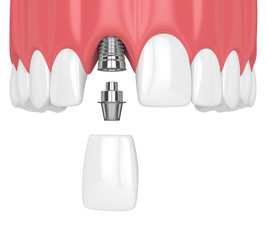Losing a tooth can create many problems for oral health and daily life. However, using a dental implant offers an excellent solution compared to traditional methods such as a bridge or leaving the gap in the dental arch.
Unlike traditional bridges, which require the grinding down of adjacent teeth for placement, the implant is placed directly into the jawbone. This keeps neighboring teeth intact and healthy.
Dental implants are known for their durability and long-term lifespan. While traditional bridges may need replacement after several years, implants can last a lifetime with proper care.
Losing a tooth can cause neighboring teeth to shift, leading to alignment problems. Implants maintain the natural alignment of teeth.
Missing teeth can cause the opposing tooth to over-erupt, leading to traumatic occlusion. Implants prevent such issues.
A gap in the dental arch can affect chewing and speech clarity. Implants restore these functions, providing a natural feel and performance.
Tooth loss can lead to jawbone resorption as the bone lacks the stimulation it needs to maintain its structure. Dental implants act as tooth roots, stimulating the bone and preventing resorption.
In the following video, we present the advantages that a dental implant has compared to a simple dental bridge.
